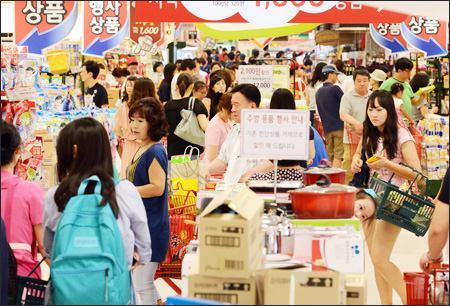
‘Visible hand’ beaten

Court rules against government measure to regulate large retailers
The government is under fire for its hasty measures to limit the operating hours of large retailers in an attempt to protect small stores, as the court has ruled that the new regulation is illegal.
The government introduced a series of new rules to help boost business for smaller stores and traditional markets earlier this year, and a number of chain stores have had to close their doors every second and fourth Sunday as well as from midnight to 8 a.m. every day since April as local governments passed related ordinances.
However, only a few months down the road the court ruled in favor of the retailers last Friday in their administrative suits against municipalities in Songpa and Gangdong districts, citing illegalities in the implementation of ordinances.
The decision came as five major discount chains including E-Mart, Home plus and Lotte Mart filed administrative suits early this month, arguing the ordinances violated the right to conduct business as well as caused inconvenience to customers.
After the ruling, 27 chain stores and super supermarkets (SSMs) in the districts Sunday opened for business. It is expected to lead to more similar administrative suits by chains in other districts, as they have suffered falling sales over the past few months.
Over 70 percent of the big discount chains and SSMs currently follow the new regulations regarding operating hours.
The nation’s three major discount chains closed 267 out of 368 stores nationwide on the second Sunday of this month while four major operators of super supermarkets closed 776 stores out of 1,084.
According to the retail industry, sales of the three largest discount store chains fell by up to 6 percent in May. In June, their revenue is widely expected to plunge by a double-digit rate.
E-Mart, the country’s largest discount store chain, posted a 4-percent drop in sales in May, compared to a year earlier, while those of Home plus and Lotte Mart declined 6 and 2 percent respectively.
The court’s decision is also expected to have an impact on the decision by the Constitutional Court, as the Korea Chain Store Association has filed a suit with it against the government’s measures, claiming the regulations violate the right to conduct business guaranteed by the Constitution.
But the Songpa and Gangdong municipalities plan to appeal against the decision, arguing the court acknowledged the necessity of the new rule but only brought the procedure of its implementation into question.
Experts say the government should be careful about introducing new rules to try and avoid these kinds of hassles.
“Municipalities should be more careful when they revise their ordinances to regulate big chain stores,” Lee Jung-hee, professor at Chung Ang University, said. “The validity and related problems should be taken into consideration.”
Against anti-market policies
The dispute between discount chains and municipalities is just a small part of the discord between the business circles and politicians. The business sector has voiced their concerns over the effectiveness and validity of the government’s regulations, especially ahead of December’s presidential election.
The Federation of Korean Industries (FKI) announced last week that it will strengthen the validity review on bills proposed by lawmakers to regulate business here, arguing “too many laws” hamper business.
The lobbying group of the country’s large businesses said it signed a memorandum of understanding with the Korea Society for Regulatory Studies (KSRS) to set up a new committee to regularly monitor bills proposed by lawmakers on a regular basis, the first move of its kind.
In response, Park Ji-won, the floor leader of the opposition Democratic United Party (DUP) strongly criticized the move.
“It’s shameful that they are trying to trample on lawmakers’ right to legislate. It’s so an arrogant idea that money can do everything,” he said.
But business circles have taken a strong stance against “anti-market policies,” especially ahead of the presidential election because so many bills are expected to be proposed to win the heart of voters.
The FKI said lawmakers in the newly-opened 19th National Assembly proposed so many new bills on May 30 and 31, half of which were aimed at strengthening regulations or legislating new ones to regulate business.
In the 18th Assembly, about 2,000 such bills were proposed and over 90 percent of them were proposed by lawmakers, the lobby group said.
Citing a related survey, the FKI also said excessive regulations against businesses have worsened corporate activities and management.
Market insiders also criticized the increasing number of regulations by the government, which is now pushing a series of measures under the aim at “democratizing the economy.”
“The constitutional stipulation ‘to democratize the economy through harmony among the economic agents’ should be removed as it only causes unnecessary confusion,” Shin Seok-hoon, researcher at the Korea Economic Research Institute said in a seminar earlier this month.
But despite such opposition, lawmakers plan to further tighten regulations on conglomerates and their affiliates.
Lawmakers from the DUP have initiated a move to force discount stores to operate until just 9 p.m. and close as many as four times a month. Currently, stores normally open until midnight.
The ruling Saeruri Party has also submitted a bill to set up a youth employment quota for companies and strengthen regulations against subcontracts. <The Korea Times/Kim Tae-jong>


